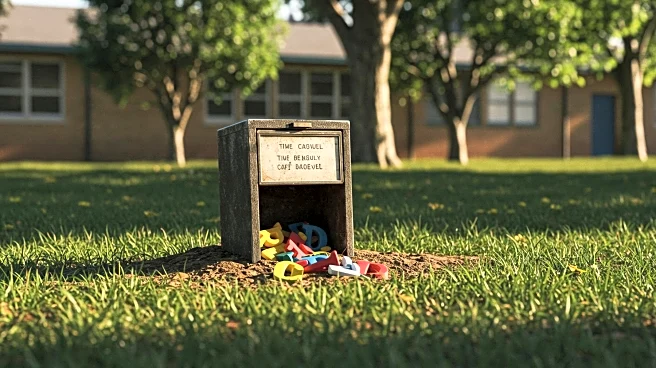What's Happening?
Scholastic Corporation has been involved in an educational initiative where Year 7 students wrote letters to their future selves during the COVID-19 pandemic. These letters, written in March 2021, were recently opened by the students as they prepare for their GCSE exams. The initiative aimed to capture the students' thoughts and aspirations during a time of significant disruption in their education due to the pandemic. Students expressed concerns about the ongoing impact of COVID-19, their personal goals, and reflections on their growth over the past four years. The letters reveal a mix of personal questions, hopes for academic success, and the challenges faced during the pandemic, such as remote learning and social isolation.
Why It's Important?
This initiative highlights the profound impact of the COVID-19 pandemic on the educational experiences and personal development of students. By revisiting their letters, students can reflect on their resilience and adaptability during a period marked by uncertainty and change. The project underscores the importance of addressing the emotional and psychological effects of the pandemic on young people, as well as the need for educational institutions to support students in overcoming these challenges. It also serves as a reminder of the long-term implications of the pandemic on education systems and the necessity for ongoing support and resources to help students achieve their academic and personal goals.
What's Next?
The opening of these time capsule letters coincides with the upcoming COVID-19 Inquiry, which will examine the pandemic's impact on children and young people. This inquiry may lead to recommendations for educational policy changes and increased support for students affected by the pandemic. Schools and educators might use insights from such initiatives to develop strategies that foster resilience and adaptability in students, preparing them for future challenges. Additionally, the reflections captured in these letters could inform broader discussions on the role of education in nurturing emotional well-being alongside academic achievement.
Beyond the Headlines
The initiative also raises questions about the ethical and cultural dimensions of education during crises. It prompts consideration of how educational systems can better integrate emotional and psychological support into their curricula, especially during times of widespread disruption. Furthermore, it highlights the importance of creating spaces for students to express their thoughts and feelings, fostering a culture of openness and support within educational environments. This approach could lead to long-term shifts in how educational institutions address the holistic needs of students, emphasizing the importance of mental health and personal development alongside academic success.









